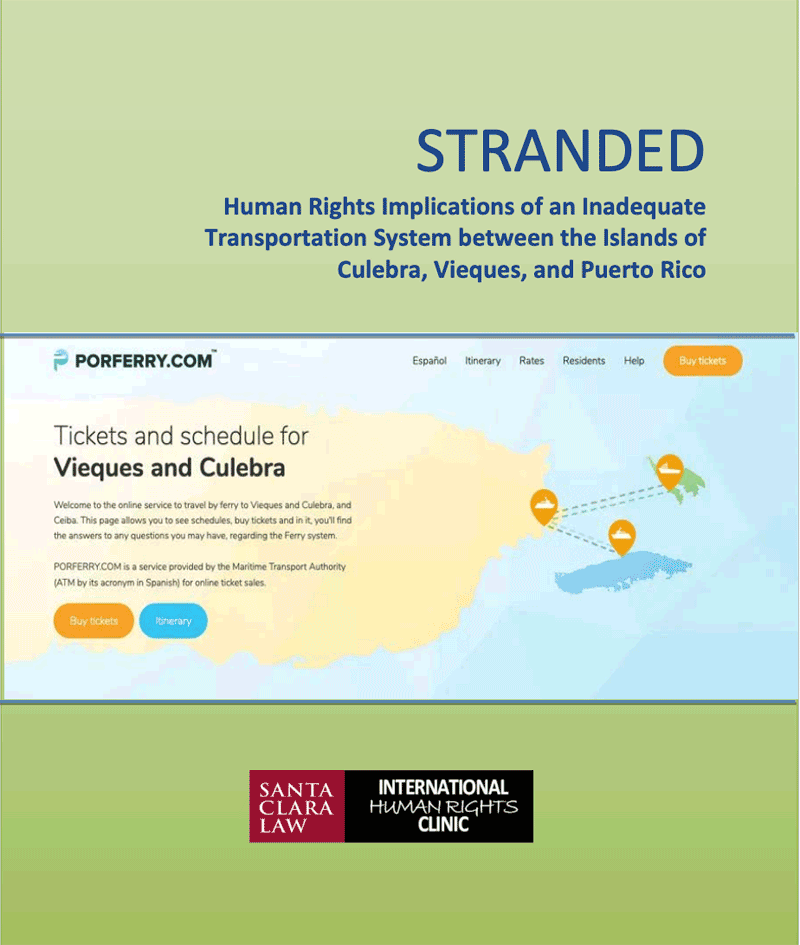The International Human Rights Clinic at Santa Clara Law in California published a comprehensive report titled “Stranded. Human Rights Implications of an Inadequate Transportation System between the Islands of Culebra, Vieques, and Puerto Rico”. The main finding of this report is that the lack of a reliable maritime transportation system between Puerto Rico and the municipal islands of Culebra and Vieques violates international human rights law. The report, which is only available in English, includes an annex containing key talking points for discussions between activists and the government of Puerto Rico, which can be found here, and a “know your rights” annex for residents of Culebra and Vieques, which can be found here.
According to the report, the ferry system that connects the approximately 10,000 residents of the small islands of Culebra and Vieques to the main island of Puerto Rico is characterized by frequent and prolonged delays, cancellations, maintenance issues, and last-minute schedule changes. This situation presents a series of challenges for residents that affect their enjoyment of basic human rights, including the rights to access education, healthcare, and economic development without discrimination.
As the Law Clinic’s director Francisco Rivera explains, “sick residents do not know if they can make it to their doctor’s appointments. Students do not know if they will make it to their classes. Business owners do not know if they will receive their shipment of goods for the day. Some residents cannot get to their court dates or appointments on time; others face health risks when their prescriptions do not arrive on time. Regardless of their personal circumstances, the lives of all Culebra and Vieques residents are marked by large-scale unpredictability that threatens their lives and fundamental rights.”
This report is the result of comprehensive research done by the International Human Rights Clinic at Santa Clara Law between Fall 2019 and Fall 2020. Drawing from the legal Clinic’s expertise, this report relies on legal analysis of relevant international human rights law in light of the facts law students gathered. Additionally, this report reflects on first-hand interviews conducted by the clinic with residents in Puerto Rico who have been affected by public maritime transportation problems. The law Clinic traveled to Culebra in October 2019 to observe the maritime transportation system and controversy surrounding it, conduct interviews with residents, and gain a factual understanding of the maritime transportation system’s impact on the lives of island residents. Contained in this report are testimonies given by community members during a Community Forum hosted by the clinic in Culebra to facilitate understanding of the various challenges the lack of adequate maritime transportation poses for residents of that island. Personal testimonies from residents of Vieques were gathered through news articles and social media outlets where numerous members of these communities expressed their concerns about the transportation system.
The objective of this report is to utilize an international human rights framework to analyze the lack of reliable access to maritime transportation between the main island of Puerto Rico and the municipal islands of Culebra and Vieques. By providing an addendum that describes legal arguments and talking points that can be used by residents and activists, as well as recommending changes to law and policy, the report aims to improve Puerto Rico’s public maritime transportation system in a way that upholds basic human rights.
The report highlights Puerto Rico’s legal obligation to protect, respect, and guarantee applicable international human rights law, including the right to access healthcare, the right to education, the right to employment and economic development, the right to live where you choose, and the right to access public transportation without discrimination. By failing to provide an adequate maritime transportation system, Puerto Rico has violated its duty to respect, protect, and guarantee these human rights to the detriment of the people of Culebra and Vieques.
The report makes several recommendations for the government of Puerto Rico, including the following:
- Maintain and enforce adequate schedules of passenger and cargo ferries that are adapted to the individual needs of each island.
- Ensure adequate access to healthcare for island residents, including sufficient emergency medical transport and adequate health care centers.
- Ensure access to public education for island residents, including access to special education for students with disabilities on the islands.
- Adopt measures to assist in promoting the economic development of the islands.
- Ensure that the use and management of the maritime transportation system adequately protects the islands’ residents from the health risks posed by the COVID-19 pandemic.
